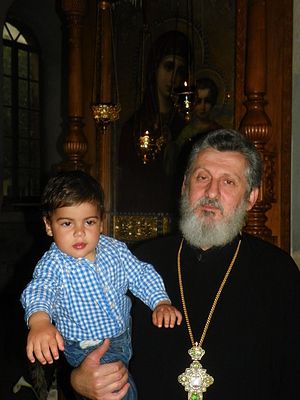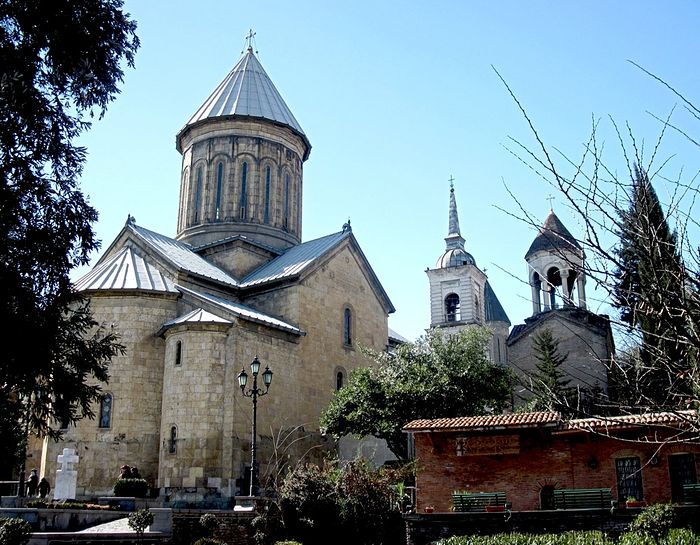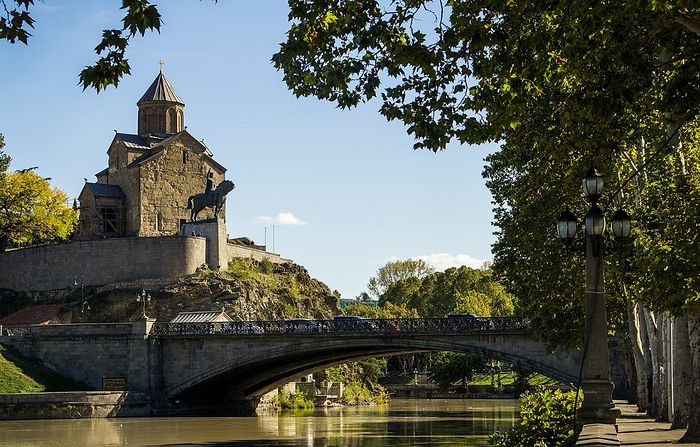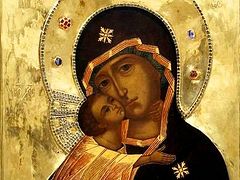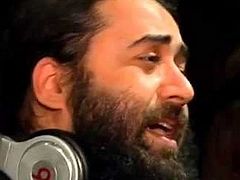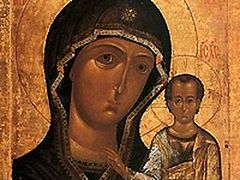I can’t drink milk—it’s Lent
I was born in 1964, in godless times. My father was not a believer, but my grandfather and grandmother believed. They preserved their faith and bore it through years of sorrow and all the trials that befell them as their lot. One time, grandma choked on the pit of a persimmon and got sick. They told her, “Drink milk—you’ll get better.”
But she answered, “I can’t drink milk—it’s Lent.”
I didn’t understand, but I memorized them, and it all developed in my heart.
Grandpa also fasted, giving up meat and dairy on fasting days, although few observed the fasts in those days. He forbade his children to work on Sundays. Grandpa was born in 1888 and died in 1982—he was 94 years old. Every evening I would see how he stood in prayer—he would pray and cross himself—but I didn’t understand then what he was praying about, what kind of prayers they were. I didn’t understand, but I memorized them, and it all developed in my heart.
When I graduated from school I went into the army. I served in Mytischi—a Moscow suburb: We built a sanatorium and restored the General Staff Academy. I was the commander’s driver.
After the army I entered college in Tbilisi in the economics department. My grandfather died, and I began to fast on Wednesdays in his memory. I wanted to honor his memory in this way, although I understood nothing about faith. Later I started fasting on Fridays too, but again, not out of faith—it just seemed to me that when I oppressed myself, voluntarily limiting myself in something, things went better for me. I hid my fasting from my classmates.
I began to go to church and light candles, but as before, I didn’t understand anything of the spiritual life.
His Holiness’ sermon really sunk into my soul
After graduating from college, I worked as an economist for some company, and I would often walk pass Sioni Cathedral. I didn’t pray, just lit some candles. They were opening churches everywhere then that had been closed in the years of Soviet power, but few people went to them—people had fallen out of habit of going to the Church services.
One time I heard a homily from His Holiness, and it really sunk into my soul. I didn’t even know yet that it was Catholicos-Patriarch Ilia II—it’s just that his homily made a great impression upon me. I began to go to Sioni more often, to hear more homilies from this man.
Sioni—one of the main churches of Tbilisi and all of Georgia
Sioni is an ancient cathedral. It is named in honor of Mt. Sinai and consecrated in honor of the Dormition of the Most Holy Theotokos. A church was built on this spot in as early as the sixth century.
In 1226, the Khwarezm Shah captured Tbilisi and, desiring to convert the Georgian people to Islam, he ordered the removal of the cupolas from Sioni, to establish a throne there, and also to remove the icons from the cathedral and to throw them on Metekhi Bridge. From the throne, the shah observed how all the citizens of Tbilisi were driven out to the bridge and promised their freedom—they had only to desecrate the holy icons by walking on top of them.
Then, one after another, the residents of Tbilisi—the elderly, women, children—preferred a martyric death. They severed their heads and threw them into the Kura, and the water of the river turned red from the blood of the 100,000 martyrs.
The centuries passed, and the church suffered numerous periods of destruction, and arose out of ruins and ash. It preserves great relics: the head of the Apostle Thomas, the wonderworking Sion Icon of the Mother of God, and the holy cross of the Equal-to-the-Apostles Nina, which, according to Tradition, was made out of grape vines, and tied with the hair of the saint herself.
How I found a spiritual mentor
One time I went to Sioni and I saw a priest coming out with a chalice. A line had formed and I got in it. I didn’t know then that it was Communion. When it came my turn, the priest asked, “Did you confess?”
I answered that I didn’t know what Confession is. He didn’t commune me, but offered to stay after the service for a conversation. I stayed, and waited, but he didn’t come out for a long time, and I left without waiting.
Several months passed, and I myself really wanted to speak heart-to-heart with the priest. I didn’t know what Confession is—I just wanted to have a heart-to-heart. I went by Sioni, and I looked: The priest was going down the steps with his matushka. I was in my car. I offered them a ride and I took them home. It was Archpriest Nikolai (the grandson of Metropolitan Constantine [Melikidze]), but I knew nothing about it at that point.
This priest really spoke to my soul. I went to the church again to look for him, but I couldn’t find him. I left, quite upset, and I looked, and he was coming out of the church after me. I was so glad, like some castaway on a desert island who saw a ship… I took him home again. He gave me a Gospel, a prayer book, and he became my spiritual guide.
By this time, I was already married, and my wife and I had children (now I have four children and three grandchildren). I started taking my family to church and we learned to confess and commune. Fr. Nikolai baptized my second child. Then Fr. Nikolai was sent to serve in Thessaloniki, and I began to go his brother, Fr. Acacius Melikidze, for pastoral care. He is now the rector of the Church of Metekhi.
Go to church—you will serve man and God
We moved from Tbilisi to my father’s place in the village due to hard times; things were easier there thanks to the garden and the animals. Every weekend I would travel 100 miles to Tbilisi for church and to my spiritual guide. The times were hard. I was working and I helped in the church. Then I became the sexton, and later a reader. I felt a duality, and wanted to decide which path to go down. I told my father, “I don’t know which path to choose. Maybe my family and I should go abroad?”
My previously non-believing father, to my surprise, answered, “It’d be better to go to church. You will serve man and God.”
I decided to ask Fr. Acacius about my future. I went to church, and Reader Jacob was there. I asked him, “Where is Fr. Acacius?”
“He hasn’t arrived yet. What do you want?”
“I want to ask him what I should do in life: work in the Church or in the world.”
Batushka arrived and went into the altar, me behind him. He prayed, turned around, and asked me, “Well, have you learned to read Old Georgian?”
“I’ve learned, Batushka. I’m trying.”
“Then you will be ordained.”
I left the altar terribly pale. Jacob took one look at me and also decided to go talk with Fr. Acacius. He read Old Georgian better than me. This is how it went, according to him: He went into the altar and asked, “Batushka, what should I do in life?”
“What are you studying?”
“To be a dentist.”
“Then, continue studying. We need good dentists.”
Jacob left the altar rather angry…
And Fr. Acacius is a well-known priest in Georgia now.
All warming themselves together around one stove
When Fr. Acacius suggested that I be ordained, the rector of Metekhi Church was Fr. Elisha. He was consecrated as a bishop in 1997, and already-Vladyka Elisha (Dzhokhadze) led me to His Holiness and asked his blessing to ordain me to the diaconate.
Vladyka Elisha was sent to Nikortsminda Cathedral in the historical Georgian Province of Racha, and he took me with him. I wasn’t ordained yet, just an altar server, and I helped Vladyka. It was very hard: My family—my wife and four children—remained on the opposite end of Georgia. Then Vladyka Elisha decided to transfer me to Metropolitan Sergei (Chekurishvili) of Nekresi in Lagodekhi, where my family lived.
I went to Lagodekhi, and Vladyka Sergei ordained me to the diaconate a week later, and on Annunciation to the priesthood. 1998 went by.
How the Most Holy Theotokos helped us rebuild a church
Vladyka Sergei lived in difficult circumstances. They needed to rebuild the churches closed during the time of the Soviet authorities. The diocese had no monasteries, the churches were destroyed, and there wasn’t even glass in the widows in Vladyka’s residence—they stretched shrink-wrap over the openings. It was very cold in the winter—everyone was together, warming themselves around one stove.
The church where I now serve as the rector was a movie theater for a long time, then a warehouse for military parachutes. The headquarters were where the altar is. Vladyka Sergei blessed me to be the rector, but the church was completely destroyed—there was nothing. We began to serve a moleben to the wonderworking Kazan Icon of the Most Holy Theotokos every Wednesday.
And what do you think? Help came! Out of nowhere there appeared benefactors who donated a large sum for the church. When that money had nearly run out, we went to see Vladyka for the remainder. I went to the bank and found out that a completely unexpected new sum, as big as the first one, had been transferred to us. I left the bank, white as chalk, saying, “Vladyka, there’s money there!”
I told him the amount, and he was also amazed. It turns out, the mayor of the city had thanked our benefactors, and they decided to help us again. And since they knew our account, they transferred a large amount to it. This money was enough for us to completely restore our beautiful church. It was built in the nineteenth century by the Russian Grenadiers that were there, and for Georgia it’s a very large church.
Miraculous help from the Most Holy Theotokos
We had one worker at the church who had really bad vision—he wore two sets of glasses. Vladyka Sergei told him, “Go ask the Mother of God—she will help you.”
He approached our Kazan Icon of the Most Holy Theotokos and prayed, and his vision began to gradually improve. His vision improved with every day, and within two months he was already walking around without glasses.
A moleben of thanksgiving
I have a classmate who lives in Kobuleti. She and her husband didn’t have children for five years. One time they came to visit us in Lagodekhi. We served a moleben before the Kazan Icon of the Most Holy Theotokos, and a year later they had a son. My classmate was always planning to come here and order a moleben of thanksgiving, but because of family cares she couldn’t find the time. Her son was already ten years old, and she still hadn’t come to thank the Lord.
Her son was suddenly hit by a car and broke his leg, and they immediately called us: “Please pray!”
We prayed. When they removed her son’s cast, then my classmate’s whole family came here, and we finally served the moleben of thanksgiving.
The Mother of God protects us
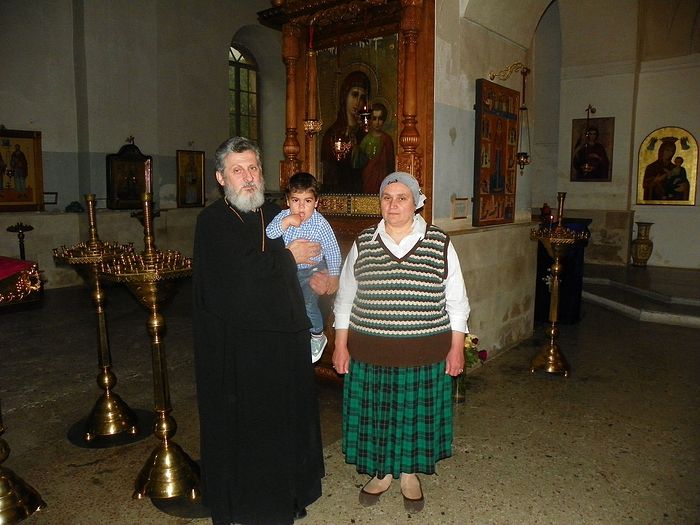 Archpriest Theodore (Khutsishvili), Matushka Nina, and their grandson George, next to the wonderworking Kazan Icon of the Most Holy Theotokos
Archpriest Theodore (Khutsishvili), Matushka Nina, and their grandson George, next to the wonderworking Kazan Icon of the Most Holy Theotokos People come to our church from various cities of Georgia and take oil from the Kazan Icon of the Most Holy Theotokos, and many are healed of their afflictions.
One time a pilgrim from western Georgia came. He prayed before our miraculous icon. I don’t know what he asked the Most Holy Theotokos about, but she helped him. Out of joy, he offered us $10,000, but we refused the money and told him, “Buy whatever you want for the church.”
He bought four chandeliers, an analoy, a panikhida table, and candlestands—you can see them in the church—they’re very beautiful.
We serve daily Liturgy in our church with the blessing of our Vladyka Sergei. Many people come here—they are drawn to God. There’s a lot of young people.
We serve a moleben every Wednesday, and every Friday an Akathist to the Kazan Icon of the Most Holy Theotokos. The Mother of God protects us.

